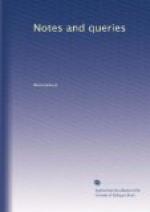M.
Taking a Wife on Trial.—The following note was made upon reading The Historical and Genealogical Account of the Clan of Maclean, by a Seneachie, published by Smith, Elder, and Co., London, 1838. It may be thought worthy of a corner amongst the Notes on Folk Lore, which form so curious and entertaining a portion of the “NOTES AND QUERIES.”
In the beginning of the year 1608 a commission, consisting of the Archbishop of Glasgow, the Bishop of the Isles (Andrew Knox), Andrew Stewart, Lord Ochiltree, and Sir James Hay of Kingask, proceeded to the Isles with power to summon the chiefs to a conference, for the purpose of intimating to them the measures in contemplation by the government. A meeting for this purpose was held at Aross Castle, one of the seats of Maclean, in Mull, at which the principal barons and heads of houses attended.
The regulations contemplated had for their object the introduction of an additional number of pious divines, who were to be provided for out of the lands of the great island proprietors; the abolishing a certain remarkable custom which till then prevailed, namely, that of taking a wife on approbation, or, in plain intelligible terms, on trial!
The following are two examples recorded of this singular custom.
John Mac-Vic Ewen, fourth laird of Ardgour, had handfasted (as it was called) with a daughter of Mac Ian of Ardnamurchan, whom he had taken on a promise of marriage, if she pleased him. At the expiration of two years he sent her home to her father; but his son by her, the gallant John of Invorscaddel, a son of Maclean of Ardgour, celebrated in the history of the Isles, was held to be an illegitimate offspring by virtue of the “handfast ceremony.”
Another instance is recorded of a Macneil of Borra having for several years enjoyed the society of a lady of the name of Maclean on the same principle; but his offspring by her were deprived {152} of their inheritance by the issue of his subsequent marriage with a lady of the Clanrannald family.
These decisions no doubt tended to the abolition of a custom or principle so subversive of marriage and of the legitimacy of offspring.
J.M.G.
Worcester, July 19.
Russian Language.—A friend of mine, about to go to Russia, wrote to me some time since, to ask if he could get a Russian grammar in English, or any English books bearing on the language. I told him I did not think there were any; but would make inquiry. Dr. Bowring, in his Russian Anthology, states as a remarkable fact, that the first Russian grammar ever published was published in England. It was entitled H.W. Ludolfi Grammatica Russica quae continet et Manuductionem quandum ad Grammaticam Slavonicam. Oxon. 1696. The Russian grammar next to this, but published in its own language, was written by the great Lomonosov, the father of Russian poetry, and the renovator of




